By the way… Spoilers. The Last of Us came out almost 8 years ago, so… yeah.
Back in ye olde days of being a GameStop employee, I heard tell of a game coming out from a company named Naughty Dog called the Last of Us. It was a simpler time for me. One of playing only on the Xbox 360… Well, I guess playing on my old Dell PC, but that doesn’t count because it didn’t have a discrete graphics card, and all I ever played was Sim City 4, or occasionally blowing up rockets in Kerbal Space Program.
Cue the release of the trailer for The Last of Us. 2012 was an interesting year, and it was the first year that I seriously considered buying a PlayStation 3. They weren’t exactly expensive at the time, but I held off because The Last of Us was the only game that I was dying to play. Instead, I just lived vicariously through the trailer, showing it to anyone that came in to the store. I was still a hardcore GameStop manager at the time, and I was getting preorders like crazy… Don’t judge me.
Anyways, I was enamored with the game right from the start, to the point that I deliberately borrowed a PS3 just to play it. So when Sony launched the PS4, they revealed that it wouldn’t be able to play PS3 games, I was a little disappointed. At least they later announced that they’d be remastering The Last of Us for the PS4, and it became one of the packed in titles as well. Score! Since I already wanted to buy a PS4 in preparation for No Man’s Sky, I convinced Jennifer to let me buy a PS4.
That was a ton of backstory just to say that I really wanted to play the game…
What About The Actual Game?
Here’s the thing. I loved it so much when I first played it, but the last time I played it up until very recently was over three years ago. Prior to that, my entire experience with the game was on the PS3 version, which is the console I beat the game for the first time on. It’s safe to say that I loved it, both for the story and the mechanics.
The gameplay design makes every instance of combat feel desperate and harrowing. Joel is a terrible shot (at least in comparison to other protagonists), and the zombies are exceedingly dangerous. The folks left behind don’t have the luxury of just being able to rub some green herbs on their bite wounds in order to combat infection; all bites are fatal… for the most part at least. So in the event that Joel gets a zombie hickey, the game instantly fades to black and it’s game over for the player.
That in itself is very much The Last of Us in a nutshell. The world is extremely unforgiving, and unless you’re playing on the lower difficulties, open combat is a poor option. One wrong move can result in a quick and unsatisfying death, so the best path to take is to scout and take the stealth approach. Following in the same vein, the rest of the game is rather slow-paced, with a majority of the experience consisting of exploration and story building, rather than packing it all with guns and explosions.
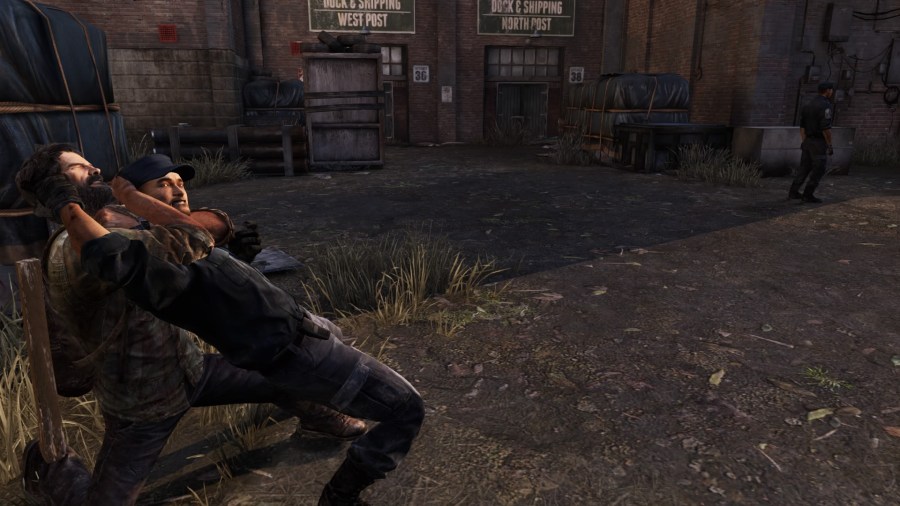
It’s easy to make friends when you like to hug people
As a result, Joel isn’t lugging around a pistol and shotgun with thousands of rounds, though he can manage to carry a truly staggering number of weapons in his tiny, little backpack. To combat this a little, Naught Dog saw it proper to make Joel a terrible shot, at least before he bulks up on supplements he looted from the local GNC.
Here’s the thing though. I remember being totally in love with the way that The Last of Us handled weapons and traversal both before it came out, and soon after launch. Joel fumbles with magazines, has trouble keeping his hands from shaking, and just doesn’t fire from the hip. I remember prior to it coming out, I watched trailers that seemed to indicate that Joel would even need to empty weapons he picked up manually… At least, that’s what I remember seeing. It’s been almost a decade since the announce of The Last of Us, so I may be s bit fuzzy on those details.
Boy was I in love with the mechanics though. Now, not so much. The player character seems so unwieldy to control most of the time, handling more like the Resident Evil characters of old. Sure, it makes a little sense since Joel is an old man, so he’s naturally not going to be sprinting around, dodging attacks and doing sweet somersaults. However, Ellie handles the same way pretty much, and Joel is remarkably lithe in situations where I know someone his age (even being in amazing shape) would have trouble… Like pulling himself up a ledge.
Shelby… It’s just a game… No! Naughty Dog obviously aimed for realistic immersion! I will not be swayed!
Anyway, at the very least, the gameplay is functional, though confusingly inconsistent at times. The developer picked the weirdest times to include (and vice versa, not include) context clues to perform both time-sensitive and normal actions, like grabbing onto a bar to pull yourself forward on a bus, or just climbing a damn ladder or calling over Ellie to help with something. Likewise, there were a number of times I noticed when I was given the option to take part in some conversation with Ellie, only for the prompt to not show up, leaving me on the receiving end of one of Ellie’s sarcastic quips even though I actually wanted to hear what the conversation was going to be.
Don’t even get me started on Naughty Dog’s approach to handling puzzles and follower stealth, because it can be pretty egregious at times. There are probably a dozen pallet/ladder puzzles throughout the game that honestly didn’t even need to exist, and while I’m grateful that Ellie and other followers can’t blow your stealth because of the ridiculously bad pathfinding, it’s jarring to watch as a clicker or bandit just strolls past your buddies as if they don’t even exist.
Still, there’s something incredibly satisfying about silently eliminating an entire group of clickers, or sneaking through an army of bad guys without anyone seeing you.
Talk, Talk, Talk

Bill, you’ll learn to love him
It’s my stance now, after years of letting the experience sit in my brain like a big fungus spider, that The Last of Us is a game that’s great despite the weaknesses of the gameplay.
“Well, if the weak part is the gameplay, then what’s the strength that makes up for it?” I hear you asking; it’s the story.
Any longtime visitors here should know that I’m a total sucker for a well-written, narrative-focused game, and Naughty Dog is excellent at leveraging their talent to this end. No, I haven’t played The Last of Us Part II at the time of me writing this, so I don’t have any opinions there yet. However, the first entry in what I’m assuming will be a series now is the story equivalent of finding a monstrous stash of ammunition in the post-apocalyptic hellscape of Boston. While I’m certainly not an expert on the subject of effective storytelling, Naughty Dog did a great job of sticking to the idea of “show, don’t tell”.
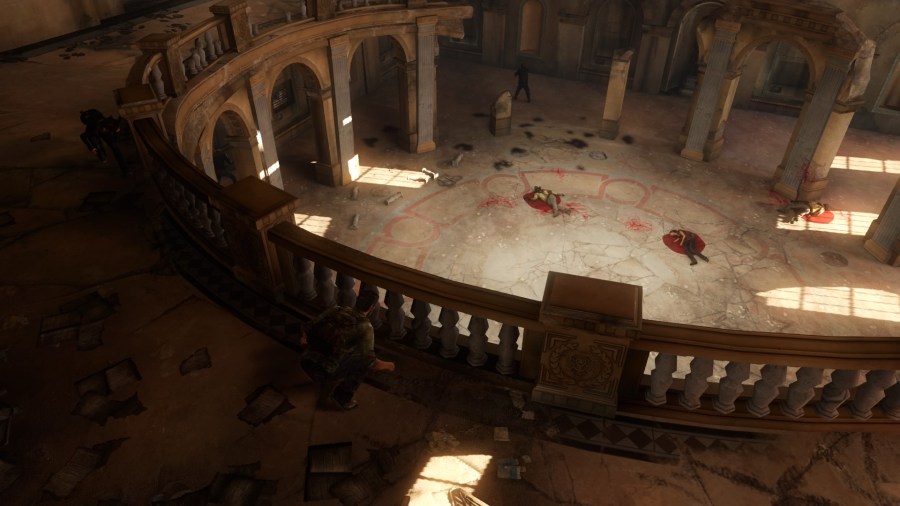
Instead of being subjected to direct confrontation constantly, there are a number of situations where the writing is on the wall instead of coming out of the characters’ mouths. For instance, when Joel, Tess, and Ellie reach the Capitol building in Boston and are quickly set upon by the quarantine zone military, Tess tries to get Joel to leave her behind. To be honest, the writers didn’t even need to have her divulge that she was bitten (though it’s understandable as a means to show how deadly serious infection is in the universe); the mannerisms she displayed showed intense desperation to do something with the little time she had left.
Another situation that stuck out to me takes place on the way out from Bill’s town. As Joel and the crew escape the high school, they make a break for a house nearby to hide out and come up with another plan (even though Bill admits they ran through plans A-Z). It’s here they stumble across a hanging corpse, and it becomes clear that it was one of Bill’s friends. It’s through further investigation in the house that you find a letter stating that Bill’s friend attempted to flee from the town following a falling-out between him and Bill. He was bitten in the process of attempting to steal a fresh car battery from the school, and chose to take his own life instead of turning. Later, you can deliver the letter to Bill, who then alludes to their prior relationship. Naughty Dog could’ve made it more obvious, but they left it up to the player instead. Because of this, the whole history of Bill and his friend carries more weight, instead of the whole can of beans being spilled out and arranged on the floor to say “Bill loved that man and he’s distraught that he drove him away.”

Additionally, there are a number of subtle clues that you can easily miss which add more depth to the world, one of which being a small grave site near a dam, marked only by a cross and a teddy bear. Joel makes a single comment about this, remarking that the grave is too small. Perhaps it’s just because I’m a father now, but that little, easily avoided section of the game hit me like a freight train. Joel doesn’t collapse at the grave, and Ellie doesn’t seem confused or distraught; it’s obvious that both of them understand that while it’s a solemn sight, it’s still a rather common reality.
Again, all of this is without a gigantic monologue, flashback, or writings in crayons to patronize the player.
I won’t jump into every example, but I’m going to leave a fantastic analysis of the game here from the YouTube channel, Writing On Games. In it, the creator talks about the subtlety that Naught Dog used to deliver their story, with one of the most powerful moments being the showcase.
While it’s a matter of opinion of the quality of the story, or the enjoyment derived from it, it’d be difficult to argue that the methods of tell the story was poor.
Relationships

Waiting is tons of fun
Where The Last of Us truly excels, is in the perfect portrayal of Joel and Ellie’s relationship. I’m not going to spell out all the nuances, because quite frankly, that’d be a really boring read. However, I do want to applaud the manner in which their bond changes over the course of the story.
In many other games, relationships seem to already exist, or they develop with odd pacing and with little context or reason. Here, Joel and Ellie’s lives intersect long after the damage has been done to Joel. His daughter has been dead for years at the time when him and Tess are looped into escorting Ellie to the Capitol building in Boston. From that point on, Joel spends a sizable portion of the game doing his best to keep Ellie at arm’s length, possibly because he doesn’t want any more attachments (further evidenced with his terse relationship with Tess), but possibly also because Ellie just reminds him of his daughter. It’s probably a combination. Thankfully they don’t beat you over the head with this, instead forcing the player to discern their bond’s status through their conversations and attitude toward one another.
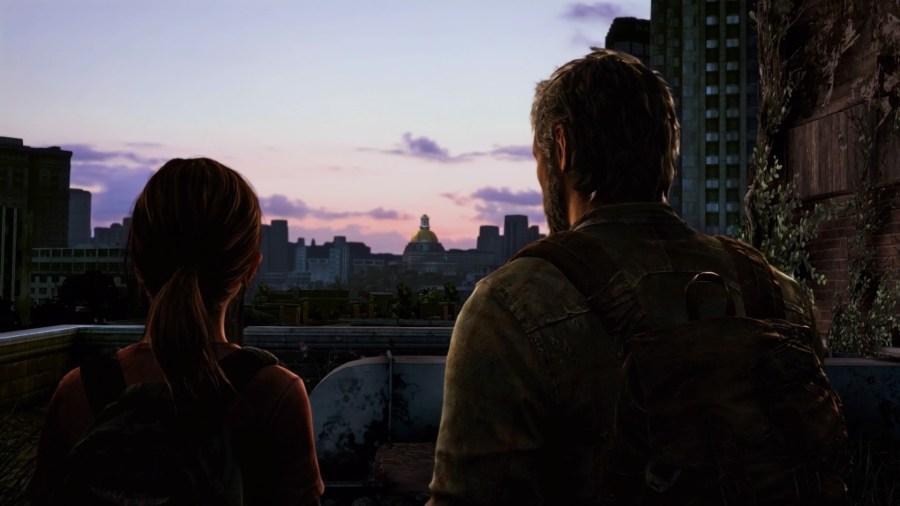
Rest is fleeting
You can see a number of times when the cracks start to show in Joel’s cold and stoic attitude, the first of note being when they exit a museum with Tess. As they climb over to the next rooftop, they come into sight of the Capitol, where Joel and Ellie pause to admire the view. You get a brief, almost invisible smile from Joel, only to have him brought crashing down to Earth by Tess.
Further along, you start to see that Joel begins to trust her more and more, and by the time they reach Salt Lake City, he’s at the point of trying to convince her to leave with him, and head back to his brother’s town. In the beginning, it was Ellie attempting to elicit information from Joel about his past, eventually reaching a point where he would calmly explain the boundaries, and later being fully open with her. Interestingly, by the time they reach Salt Lake City, she’s become the closed-off one, whether it’s because she knows their journey is coming to an end, or she’s trying to deal with the load of what occurred to them in the winter.
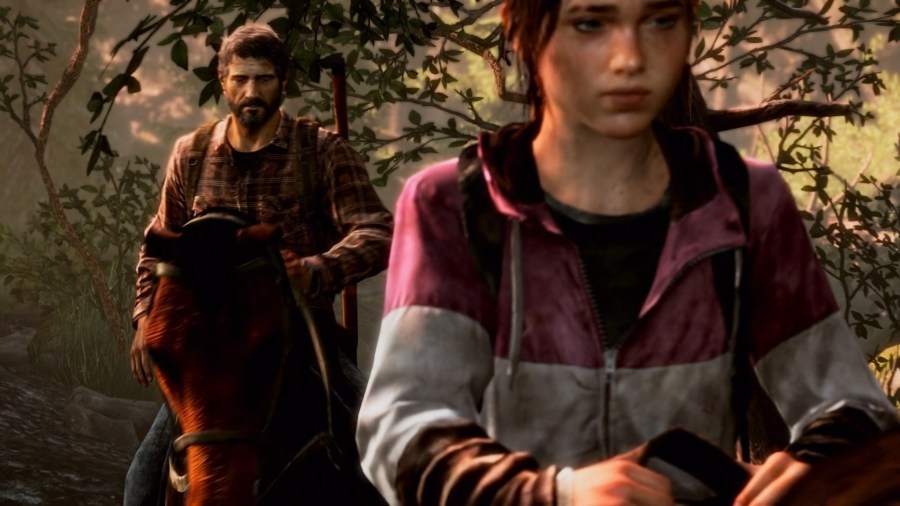
It’s a complicated relationship that evolves with subtlety, often through the lack of conversation than outright confrontation. It’s heartwarming to see the way that Joel lets down his guard, even if the result is his actions dooming humanity to preserve a single life. I won’t get into whether or not Ellie knew what was in store for her ahead of time, but it’s clear that by the time the credits roll, she understands that Joel wasn’t honest with her, and his unwillingness to let go for a greater cause left her with an even worse case of survivor’s guilt.
Things Are A Mess
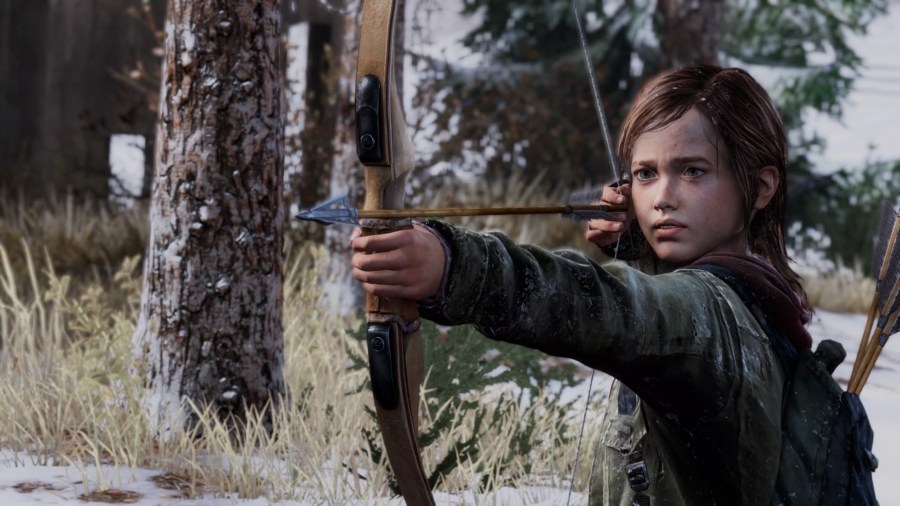
Ellie seemed like the logical choice for a sequel’s main character, even at the time
Not just in the universe of The Last of Us, but the game in its entirety. I stand by my judgement that the story is fantastic, the visuals and character modeling is astounding for the time (and it still looks pretty good on PS4), and the way that combat is designed to be less preferred over stealth is well-tuned. However, none of this comes without the caveats that there are a number of glaring issues still, though it’s infeasible to assume they could be fixed now.
One thing does make me worry though, as I sit here finishing my barrage of thoughts on The Last of Us. It’s that I’m not entirely sure I felt a second part was necessary at all. I know that they previous game left on a bit of a cliffhanger, but it was a satisfying one still. The tension and uncertainty of the ending fit perfectly into the greater scope of the story, along with the tone of said story. What’s clear to me is that The Last of Us Part II has some mighty big shoes to fill, and I don’t know if it’s going to live up to that challenge.
What are your thoughts on The Last of Us? Did you enjoy the mechanics, the story, or the characters? What are some parts that stuck out to you personally? Any favorite moments?
Other than the giraffe of course…
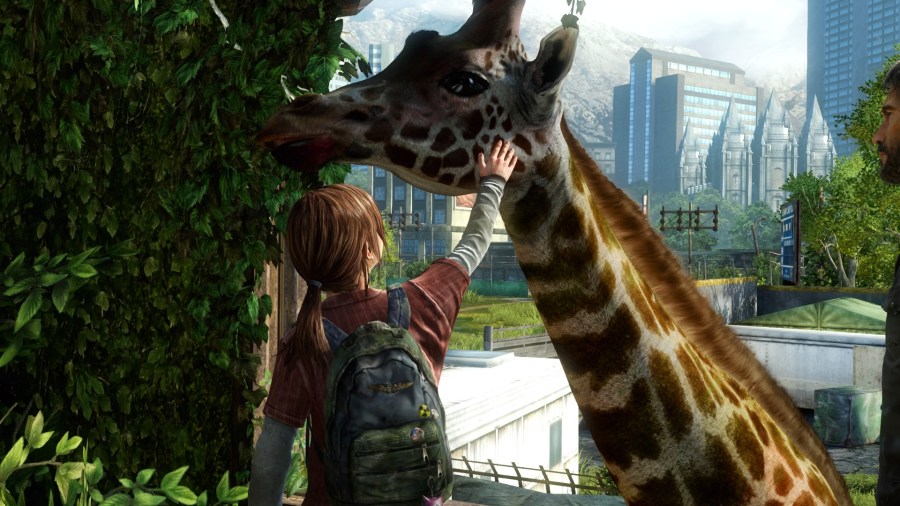
Obligatory giraffe says hi

Nice to have a little trip down memory lane, just as I am picking up the sequel! Yes, that was my conclusion – the weaknesses in the gameplay were far outweighed by the story. I always thought that Ellie knew Joel was lying at the end but decided not to press the matter – but from what I hear about Part 2, that doesn’t sound like it’s the case.
LikeLiked by 1 person
I haven’t gotten very far in Part II, but I can’t tell at least if she knew he was lying, though I think she definitely suspected he was. However, I think she didn’t want to believe he was lying at least.
Not sure how I feel about the game just yet, but I’m definitely conflicted. Time will tell.
LikeLiked by 1 person
What a ride. Played for only the second time when I did the remastered version just before part II released. Just finished part II a couple days ago, you must play!
LikeLiked by 1 person
I’m working on it, but it has been a slow process with the little one needing so much attention. It’s safe to say that I’m intrigued, though I definitely have my own reservations already.
LikeLiked by 1 person
I put that ending analysis on my watch later list. I loved the ending, which probably sounds weird to say because of what the ending was, but it was perfect for the narrative. It followed not only the overarching story but Joel’s character as well. Ellie, for all intents and purposes, his daughter; she replaced Sarah, and he’d already suffered the worst loss a parent ever could. He wasn’t going to let that happen again. I completely understood his motivations even if I can’t condone everything he did for his goals. I’m fond of characters like that who have complicate my moral circuits :p
LikeLiked by 1 person
I agree with you wholeheartedly on all accounts. I loved the ending, even with its open-ended conclusion and air of distrust. I loved the way their relationship progressed, and how it didn’t feel forced, as well as the complicated nature of Joel’s VERY grey-area decision making.
LikeLiked by 1 person
I still need to write my review of that game. It’s lower on my list because I feel like a lot of smarter people have said a lot of smart things about it, and while I might be able to add my own perspective, most of what I’d say has already been said. I absolutely love the Grey and Grey Morality of TLOU because it most realistically depicts what the world would probably be like in such a situation.
LikeLike